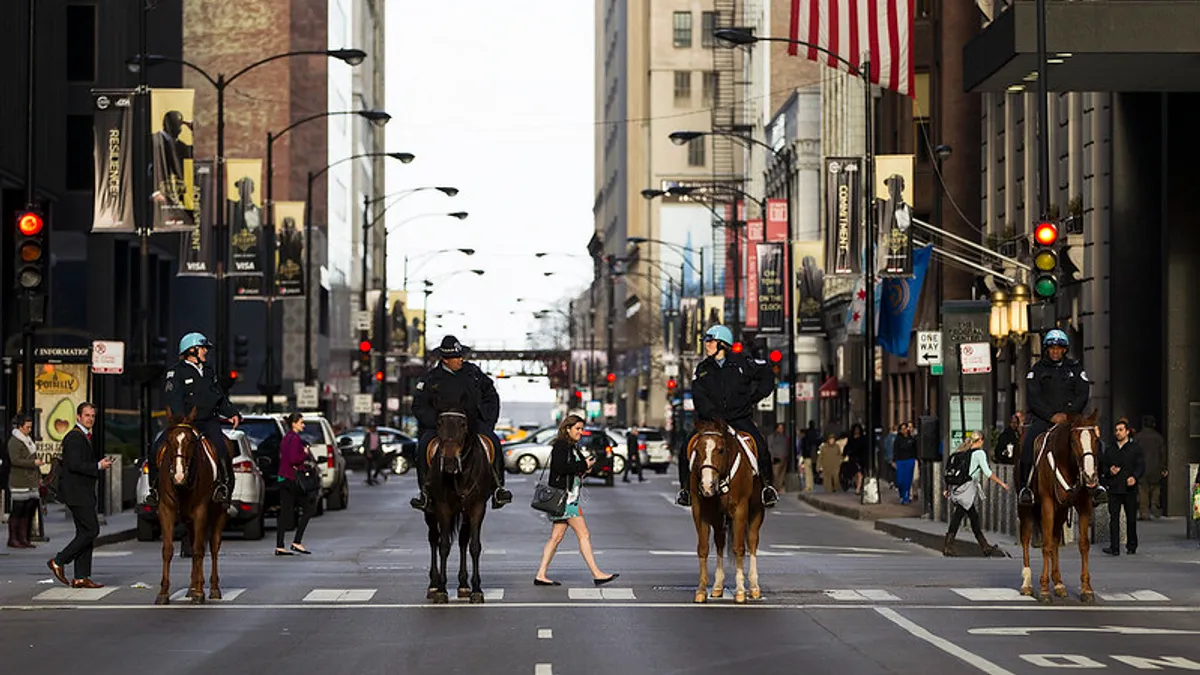Dive Brief:
- The Chicago Police Department (CPD) released a public sentiment dashboard that illustrates how safe residents feel in their neighborhoods and how much they trust the local police. The dashboard is designed to support the department’s efforts to increase transparency with data and analytics, according to an official announcement.
- The dashboard was published in partnership with national data research company Elucd, which began gathering local resident feedback in late 2017. So far, more than 63,000 Chicago residents have contributed responses, with the survey collecting up to 2,000 responses every month across all 22 police districts.
- Despite a dip in local levels of trust for the police around July 2020, the dashboard still shows an overall increase in trust since 2017. However, there are disparities in levels of trust depending on a respondent's race, gender, neighborhood and income. Residents in Chicago’s predominantly-Black West Garfield Park neighborhood, for instance, are in an area that reports a trust score of 52 out of 100 compared to the predominantly-White Lincoln Park neighborhood, where residents report a trust score of 67 out of 100.
Dive Insight:
Chicago is one of many cities seeking to bolster trust between its police department and local residents following a period of civic unrest over police killings and misconduct. Dozens of people recently filed a federal lawsuit against Chicago police officers alleging they were mistreated and unlawfully arrested amid protests over the police killing of George Floyd, the Chicago Tribune reports.
"We’ve certainly seen an increase in demand from the public for more transparency, more accountability, more proof that their voices are being heard," Elucd Chief Operating Officer Sujeet Rao said. "At the same time, we’ve seen an increase in demand from city leaders to have an understanding of what’s happening. They want to know how they’re doing… what trends are going the right way, which trends are headed in the wrong direction."
The survey aims to help build trust by gauging resident sentiment through questions like: "How much do you agree with this statement? The police in my neighborhood listen to and take into account the concerns of local residents" and "When it comes to the threat of crime, how safe do you feel in your neighborhood?"
Other notable findings from the report include that people with an annual income of $100,000 and over have a trust score of 70.9 — more than 10 points higher than those with an annual income of up to $29,000, according to the dashboard charts. And residents who are older than 55 report a trust score of 67.3 compared to the 18 to 34 years-old residents who reported a score of 59.8.
The dashboard’s roughly two-year pilot period was funded through a consortium of local philanthropy organizations as a type of "proof of concept," according to Rao. And the expectation is for the city to take on the cost going forward next year, with Chicago’s pilot costing $220,000 per year, Rao said.
Chicago’s efforts to build trust among residents and police also follow a year where the city has seen over 900 murders, more than double the number of homicides that occurred last year. While some experts have blamed the effects of the pandemic as a potential cause, other experts have also said that police distrust could in part cause communities of color, where violent crimes and police brutality can be concentrated, to withdraw even further from interacting with the police and reporting crimes.











